- Home
- Bette Lee Crosby
Previously Loved Treasures
Previously Loved Treasures Read online
Previously Loved Treasures
The Serendipity Series Book Two
A Novel
Bette Lee Crosby
Previously Loved Treasures
Copyright © 2014 by Bette Lee Crosby
Cover design: Valentine Design
All rights reserved. No part of this publication may be reproduced or transmitted in any form by any means, electronic or mechanical, including photocopy, recording, or information storage and retrieval system without permission in writing from the author, except by reviewers who may quote brief passages for a review to be printed in a newspaper, magazine or journal.
This is a work of fiction. While, as in all fiction, the literary perceptions and insights are based on life experiences and conclusions drawn from research, all names, characters, places and specific instances are products of the author’s imagination and used fictitiously. No actual reference to any real person, living or dead, is intended or inferred.
ISBN # 978-0-9891289-6-4
BENT PINE PUBLISHING
Port Saint Lucie, FL
A NOTE FROM THE AUTHOR
The fruit of the Spirit is love, joy, peace, patience, kindness, goodness, and faithfulness
Galatians 5:22
I have been blessed with all of these things in the friendship and support of those who helped me to make this story a reality. To list the names of all to whom I owe a debt of gratitude, would take many pages, but I believe each person knows how thankful I am for their unique support. And, I hope I have stopped along the way to express my appreciation to each of you individually.
A special thank you to the ladies of my BFF Fan Club, gals who have cheered me on and generously shared my books with their friends. Without such readers, I would be lost. And I also would be remiss if I did not mention Coral Russell, Naomi Blackburn, Ekta Garg and Kathleen Valentine—I could not do without the amazing help and guidance of these awesome women.
Lastly, but certainly not least, I thank my husband Richard. It would take a forest of trees to provide enough paper to list the reasons why I love him as I do.
Dedicated to the memory of
JoAnn Braun
Special Friendships are Forever
Ida Jean Sweetwater
1989
I fell in love with Big Jim when I was seventeen and never stopped loving him. He was the kind of man you can’t stop loving. He was like his name says: big. As a baby he was born big, and as a boy he grew into a man with a fullness twice the size of life itself. When Jim laughed you’d swear it was a roll of thunder coming down from heaven, and once he’d made love to you, you knew there’d never be anybody else.
There was never a day when I didn’t love Jim, but there were plenty of times when I also came within a hair’s breadth of hating him. During the summer of fifty-five I couldn’t find a kind word to say to him. Even though he was only partly at fault, I blamed him for what happened. More than once I wished he’d walk out the door and never come back. Those were the bad years, but somehow we got through them.
I suppose that’s how marriage is. When the preacher says it’s for better or worse, you’re so blinded by the possibility of better you fail to see the reality of worse. Maybe that’s a good thing. If I had known about the heartache that lay ahead I might have turned my back and walked off. I could have avoided the misery, but I would have missed out on a whole lot of happiness too.
Nineteen fifty-four. That was the year our boy, James, stood toe to toe with his daddy and said it was his life and he’d live it however he damn well pleased. James was just like his Uncle Max, wild and irresponsible. One word led to another, and pretty soon it blossomed into an argument that could’ve been heard fifty miles away. Finally James just turned and walked out the door. That was the last I saw of our boy. He was nineteen.
I pleaded with Jim to go after James and bring him home, but it didn’t happen. Jim was big on a lot of things, but the one thing he wasn’t big on was forgiveness.
This afternoon I said goodbye to Jim, and as I stood there watching them lower him into the ground I decided to do what I should have done over thirty years ago. When that first thump of dirt landed atop his casket I said a prayer asking Jim to please forgive me, but the truth is I know he won’t. As I told you, Jim was not a forgiving man.
The Silent House
In the weeks following Big Jim’s funeral Ida began making plans for her future. Even though Jim was gone, she could set things right by finding James.
The last time she heard from him he was living in Plainview, a town ninety-seven miles north of Rose Hill. A place she’d never before been to. Plainview was where she would start her search. No major highway ran by the town, but a back road wound across a seemingly endless stretch of flat land. Land that was barren and without a gas station or roadside stand where you could stop for a sandwich or cold drink. Ida took a bottle of Pepsi Cola from the refrigerator, tucked it into her purse, then pulled on her sensible walking shoes and climbed into the car.
When she started out Ida felt optimistic, certain she’d find James and just as certain that he’d welcome the thought of returning home. Never mind that thirty years had passed; never mind that he was now a man in his fifties. Ida pictured him as only slightly older than the nineteen-year-old lad who left home, his hair still dark, his face without the creases of age. She even imagined the possibility he could be married and she delighted in thoughts of a grandchild, a feisty little tyke who would scatter toys throughout the rooms and bring the sound of laughter back to the empty house. In her handbag Ida carried a picture of James. She had taken it the week after graduation; it was the one where he leaned against the side of his green Pontiac and smiled the smile of a man without a care in the world.
Ida arrived in Plainview shortly before noon, drove to the center of town, and parked the car on Market Street. Once she stepped onto the street, the thought of “What next?” settled on her and ripped loose a bit of the optimism she’d started out with. The town was bigger than she thought it would be and busier. Much busier.
A few doors down Ida spied a coffee shop where people hustled in and out. That seemed as good a place as any to start. She walked in, sat on a counter stool, and waited. Her thought was to start up a casual conversation with the waitress and then work her way around to asking if the girl knew James, but she never got the chance. Before she could pull the picture from her purse, a group of businessmen came in hungry for lunch and in a hurry. Moments later three ladies followed, and before long every seat in the luncheonette was filled. Ida waited, thinking the rush would slow and the girl would have time to talk. But it didn’t. As soon as one group left, another took its place. After lingering over a single cup of coffee for nearly a half hour, she climbed off the stool and left.
Her next stop was the drug store, where the pharmacist shook his head and said that he couldn’t recall ever seeing such a man. It was the same at the dry cleaner, the hardware store, and the library. Ida had considered the library a long shot anyway, since James wasn’t one for reading. After she’d thumbed through the Plainview telephone directory and stopped in every store on Market Street, Ida drove crosstown to the post office. She handed the elderly clerk the last postcard she’d received from James. On the face of the card was a picture of the three-story Elgin Hotel but no street address.
“I’m looking for a young man who may have been living at this hotel,” Ida said. “Of course by now he’s most likely moved into a more permanent residence, so I was wondering if you might—”
“The Elgin burned to the ground years ago,” the clerk replied.
“Years ago?”
He nodded. “In fifty-eight, or maybe it was fifty-nine.”
The clerk shook his head. “Not to my recollection.”
“What about injuries? Was anyone severely injured?” Ida conjured a picture of James, still a young man but sitting in a wheelchair, incapable of speech, unable to call out for her.
“Unh-unh, the place was empty. It closed down a year or so before the fire. When Hilda Wilkins owned the Elgin it was a nice hotel, but after she died it pretty much went to ruin.”
After a good fifteen minutes of chit chat about how the town had changed and not for the better, the clerk agreed to check and see if they had a listing or change of address for James Sweetwater. He disappeared into the back room and after a lengthy absence returned, only to say there was nothing.
“Nothing?” Ida repeated. “No address? No change of address?”
It was late in the day when Ida left the post office. By then her legs were tired, her feet ached, and her heart was weighted with more than thirty years of worrying about James.
~ ~ ~
On the drive home the sky turned from day to dark, and the road seemed to grow longer. The weariness of the years spread throughout Ida’s body. It made her arms heavy and her legs feel as though they had turned to stone. The sorrow of all that had been lost plucked her heart from its rightful place and dropped it into the pit of her stomach.
That’s when she began to sob. She’d been so determined, so convinced she could find James, that the disappointment now felt unbearable. When she pulled into the graveled driveway the house appeared even larger than it had when she left. Larger and emptier. She climbed from the car and walked toward the door with shoulders hunched, pushing her into a slow step-by-step movement. Once Ida opened the door the only sound she heard was that of a grandfather clock ticking, counting off the seconds, minutes, and hours of loneliness that lay ahead.
Not thinking of food, she climbed the stairs and fell across the bed she’d shared with Big Jim. In the fifty-six years they’d been married she had never once slept apart from him, and now apart was all there was. While the sky filled with stars and the moon rose, Ida wept. She thought back on the night it all began…
It was in the spring of 1954, when Big Jim told the boy if he wasn’t going to college he’d have to get a job and pay ten dollars a week for board. There’d been a big row over it, and James, in that cavalier way he had of talking down to his daddy, said life was too short for nothing but work.
“There’s a lot of fancy living outside of this little peapod town,” James said, “and that’s what I’m after.” Then he continued with the statement that ultimately pierced his daddy’s heart.
“I’m too smart to end up like you, Daddy. Way too smart.”
Such an attitude rankled Jim to the core. He’d grown up poor and gone to work when he was not yet thirteen. As a boy he had loaded trucks during the day, tended a gas station at night, and worked in the print room of the Rose Hill Chronicle on weekends. It mattered not that it was long hours or demeaning work; what mattered was that in time he’d made something of himself. Now when Jim owned the largest house in Rose Hill and had enough money to send his son off to college, the boy looked down his nose at such an opportunity.
Angry words flew back and forth for nearly two hours. Finally James turned and walked out the door. He stopped for one brief second, looked back, and said, “Bye, Mama.”
Ida had held on to that fleeting moment all these years. She told herself James hadn’t wanted to go, and for a long while she blamed Jim for allowing such a thing to happen.
During the first year or two Ida searched for James numerous times. She called the friends he’d known, the places he’d frequented, even a few young ladies who occasionally came knocking on the door. It was always the same story: James had been there and gone. When there was no longer a trace of where he’d been, she held to the belief that he would sow his wild oats and then return home. The months became years and years turned into decades, but still there was no word. With the passing of time, Ida settled into the unhappy realization that the boy did not want to be found.
Although in many ways they were different, Big Jim and his son were very much alike—both of them proud and stubborn. On bad days when the sky was black and her heart heavy, Ida told herself that in time even the most stubborn heart would grow weary of carrying such a grudge. But it never happened.
~ ~ ~
Ida lay on the bed sobbing long into the night before her tears ran dry and sleep finally overcame her. In the morning she woke with her eyes crusted and her hair matted, but during the night she had come to the realization that she needed help if she wanted to do anything more than simply wish for James to come home.
She called Sam Caldwell first. He was not someone she knew but simply a name taken from the yellow pages of the telephone book. “Investigations and surveillance” the ad said. Then it told how Sam had been in business for more than twenty years and was registered with the county and state. But it was the tagline that convinced Ida to make the call. At the bottom of Sam Caldwell’s ad in a seemingly hand-written script it read, “Missing Persons Specialist.”
When Ida Jean Sweetwater walked into Sam Caldwell’s office she was prepared to answer questions about her missing son. She’d brought along a picture and a shirt she’d taken from his closet. She thought she was prepared for anything, but she wasn’t prepared for the sizable price tag hanging on Sam Caldwell’s services.
“It’s an eight hundred-dollar retainer to cover the first two weeks,” he said, “then three hundred a week for as long as I’m actively working the case.”
Ida gasped. “Doesn’t that seem rather high?”
“Not really,” Sam answered. Then he explained that expenses were extra.
Ida hesitated for a moment, picturing the balance in her checking account. “How long do you think it would take to find James?”
Caldwell shrugged. “Could be days, could be months.”
Ida pictured the bank account again. There had been so many expenses: Jim’s illness, the doctor bills, the funeral. She could swing two months if she cut back on groceries and Sam’s expenses didn’t cost too much.
“Okay,” she said. “You’re hired.”
She pulled out the checkbook that still had Jim’s name on it and in a shaky hand wrote the check for eight hundred dollars. She had never in all her life written a check for that much money.
~ ~ ~
That night Ida heated a can of chicken rice soup for her dinner then sat down at the table with her checkbook and stack of bills. On a yellow tablet she wrote columns of what had to be paid and what could wait, what was necessary and what could be considered a luxury, and in very small box at the bottom of the page she added up any income she expected. With Jim gone the Social Security would be considerably less, and most of their savings had gone to pay doctors during Jim’s long illness.
On a second sheet of paper Ida began to list the things she might do to make some money. First she’d sell the little bit of jewelry she had, all but the thin gold band Jim placed on her finger the day they were married. That she’d never sell. It no longer fit her arthritic finger, but it dangled from a chain around her neck and nested in the crevice between her breasts. As the hours of the evening slid by, Ida added any number of other thoughts to the list: babysitting, sewing, light housework, homemade pies.
When she crawled into bed that night Ida knew that somehow, someway she would find the money to pay Sam Caldwell for as long as it took to find James. Whatever she had to do, it would be easier than living with the silence of the house.
Pies, Lies, & Max
A week passed before Ida heard back from Sam Caldwell, and even then it was just a piddling bit about how James had left Plainview in 1958 and moved to Lodi, New Jersey.
“He left Lodi in sixty,” Sam explained, “and it looks like he moved down to Nashville.”
&nbs
p; “That’s quite possible,” Ida answered. “James always liked music. In high school he played a saxophone in the band.”
When Ida began to sound a bit too optimistic, Sam said, “Bear in mind this was twenty-nine years ago. A lot could have changed by now.”
“Oh.” Ida sighed. “I’d rather hoped…”
“Don’t worry, I’ll find him. It’s just a question of time.”
Although she didn’t say it aloud Ida thought, Time and money. Hopefully she wouldn’t run out of either before he found James.
~ ~ ~
Two days before she had to make her first three-hundred-dollar payment to Sam Caldwell, Ida walked into Suzanne’s Bake Shop with two pies, one apple and one peach. She set them on the counter and said, “I thought you might be interested in ordering some homemade pies.”
Suzanne laughed. “I sell pies, not buy them.”
With her bank account going down faster than the lake in a drought season, Ida reached down to the soles of her feet and hauled up enough courage to say what she’d come to say. “You don’t sell pies like these.”
Suzanne chuckled. “Says who?”
Ida pulled a pie server and small china plate from her tote bag. First she cut into the apple, which was her particular favorite, carved off a good size slice, and handed it to Suzanne. “Taste this. If you don’t agree, I’ll leave and not bother you again.”
The bakeshop owner forked a bite into her mouth and chewed. After what seemed to Ida an excruciatingly long time Suzanne looked over with a raised eyebrow. “You make this yourself?”
“Yes, indeed,” Ida answered. “And there’s plenty more where that came from.” She explained that she wanted three dollars each for pies that could easily be sold for six. “I’ve got apple, peach, and blueberry, and I can do nine pies a day.”

 Emily, Gone
Emily, Gone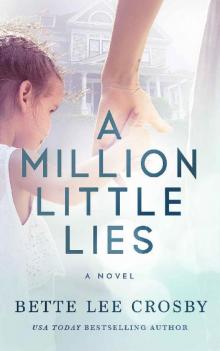 A Million Little Lies
A Million Little Lies Previously Loved Treasures
Previously Loved Treasures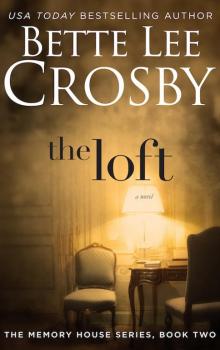 The Loft
The Loft Spare Change
Spare Change Memory House: Memory House Collection (Memory House Series Book 1)
Memory House: Memory House Collection (Memory House Series Book 1) Silver Threads
Silver Threads Wishing for Wonderful: The Serendipity Series, Book 3
Wishing for Wonderful: The Serendipity Series, Book 3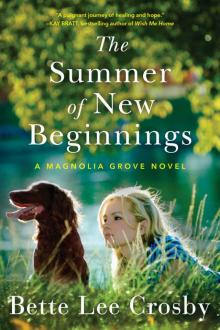 The Summer of New Beginnings: A Magnolia Grove Novel
The Summer of New Beginnings: A Magnolia Grove Novel The Regrets of Cyrus Dodd
The Regrets of Cyrus Dodd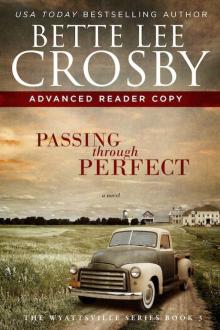 Passing Through Perfect
Passing Through Perfect Baby Girl
Baby Girl Jubilee's Journey
Jubilee's Journey Beyond the Carousel
Beyond the Carousel What the Heart Remembers
What the Heart Remembers Cupid's Christmas
Cupid's Christmas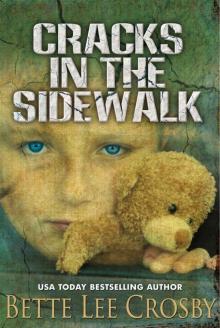 Cracks in the Sidewalk
Cracks in the Sidewalk Blueberry Hill
Blueberry Hill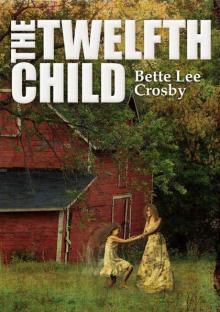 The Twelfth Child
The Twelfth Child A Year of Extraordinary Moments (A Magnolia Grove Novel)
A Year of Extraordinary Moments (A Magnolia Grove Novel)